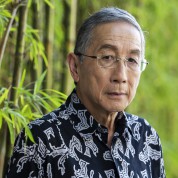
Tikki Pang
Visiting Professor
National University of Singapore
Professor Tikki PANG is an Indonesian citizen and is presently Visiting Professor, Yong Loo Lin School of Medicine, National University of Singapore. He was previously Visiting Professor, Lee Kuan Yew School of Public Policy, National University of Singapore (2012-2020) and Director, Research Policy & Cooperation, World Health Organization (WHO), Geneva, Switzerland (1999-2012). Prior to joining WHO, he was Professor of Biomedical Sciences, Institute of Postgraduate Studies & Research, University of Malaya, Kuala Lumpur, Malaysia (1989-1999) and Lecturer/Associate Professor, Dept of Microbiology, Faculty of Medicine, University of Malaya, Kuala Lumpur, Malaysia (1977-1989). He was Co-Director of the WHO Collaborating Centre for Dengue & Dengue Haemorrhagic Fever at the University of Malaya, Kuala Lumpur, Malaysia (1982-1995). He holds a PhD in Immunology-Microbiology from the Australian National University, Canberra, Australia and is a Fellow of the Royal College of Pathologists (UK), Institute of Biology (UK), American Academy of Microbiology (USA), Academy of Medicine of Malaysia, and Academy of Sciences for the Developing World (TWAS). He has served as Chair of the Board of Directors, Asia Pacific Leaders Malaria Alliance (APLMA) and the Southeast Asia Community Observatory (SEACO), and is presently Co-Chair of the Asia Pacific Immunization Coalition (APIC). He has been a member of many WHO Scientific & Technical Committees and has published >250 scientific articles and 12 books, and was lead author on several major WHO reports including the World Health Report 2013: Research for Universal Health Coverage (2013), Knowledge for Better Health (2004) and Genomics and World Health (2002). He has served as an independent consultant and board member of many organizations in the health sector, in both public, NGO and private sectors.
Professor Pang has a recognisable profile as a public health expert both nationally and internationally. His research interests are in the epidemiology, pathogenesis, laboratory diagnosis and prevention of infectious diseases, biosecurity and dual-use research, genomics & health, and in health research policy, health research systems, global health governance, development of research capabilities in developing countries, linkages between research and policy, vaccine confidence and harm reduction approaches to mitigate health problems. He has >30 years of teaching experience at undergraduate & postgraduate levels in the fields of medical microbiology, immunology, global health policy & issues, and in evidence-informed policy development. He has supervised 20 Master’s degree and 10 PhD candidates.
26
Jan
PS3.2
08.00 - 10.00 (BKK)

